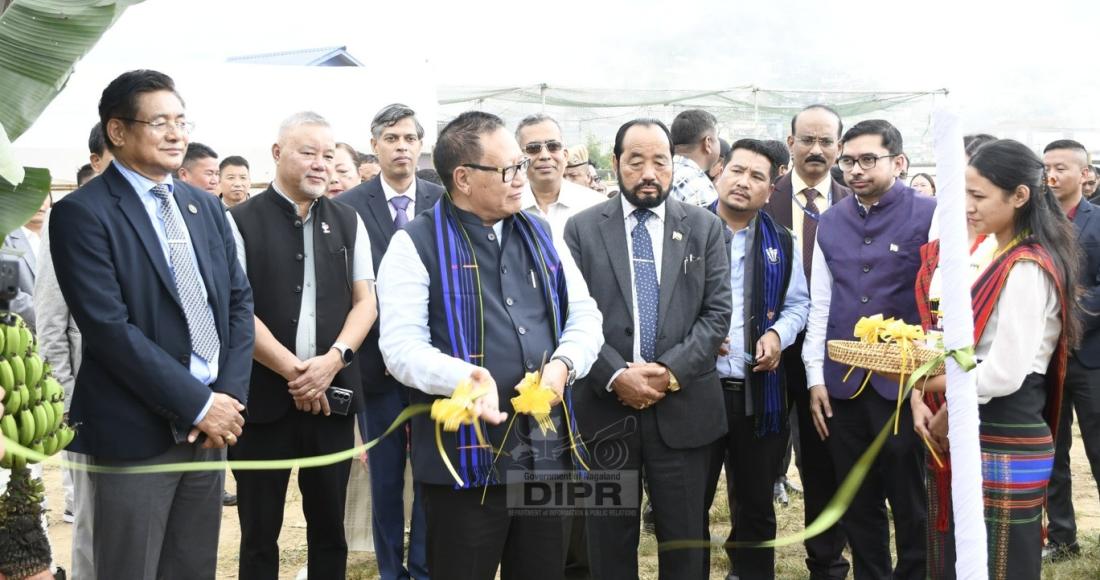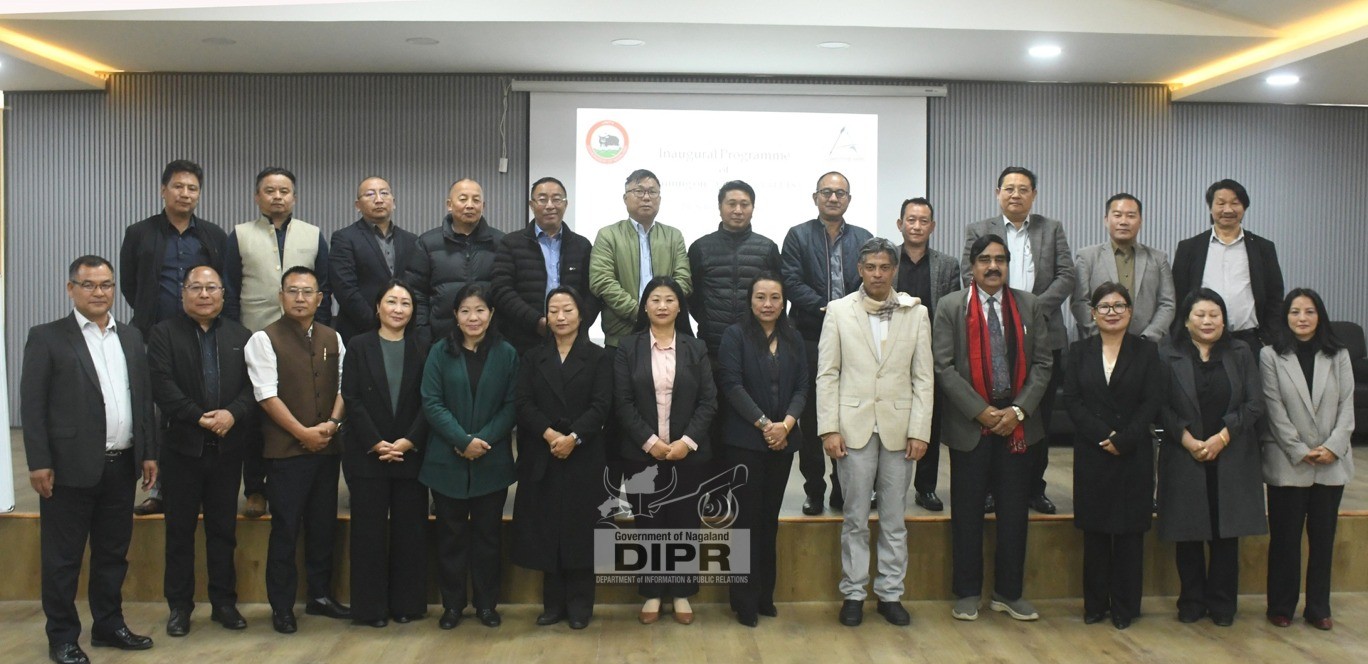The first edition of the Banana Festival 2025 commenced at the Public Ground, Wokha on 22nd Oct. 2025 under the theme “Banana for Food, Fibre and Future.” The three-day event, scheduled from October 22nd to 24th, 2025, is a landmark initiative aimed at promoting agricultural innovation, empowering farmers, and strengthening market linkages across Nagaland.
The inaugural ceremony was graced by Deputy Chief Minister and Minister of Planning & Transformation and National Highway, T. R. Zeliang, as the special guest. He was accompanied by Minister of Environment, Forest and Climate Change, C. L. John; Minister of Women Resource Development, Salhoutuonuo Kruse; and MLA & Advisor to Water Resources, Tongpang Ozukum.
Deputy Chief Minister and Minister of Home & Border Affairs, Yanthungo Patton, served as the chief host. MLA and Advisor for Agriculture, Mhathung Yanthan, and MLA, Y. Mhonbemo Humtsoe, attended as hosts.
A key highlight of the inaugural programme was the signing and exchange of a Memorandum of Understanding (MoU) between District Administration Wokha and three national research bodies:
- ICAR–National Research Centre for Banana, Tamil Nadu
- Institute of Bioresource and Sustainable Development (IBSD), Imphal
- CSIR–North East Institute of Science and Technology, Jorhat
The MoU aims to establish long-term partnerships focused on technological integration, scientific farming, production enhancement, circular economy promotion, joint research, cultivation of medicinal and aromatic crops, farmer training, sustainable practices, and improved market linkages.
In his address, Deputy Chief Minister T. R. Zeliang expressed profound gratitude for the visionary initiative and acknowledged the organising committee. He emphasised that the festival would serve as a platform to connect producers with consumers, boost the local and rural economy, generate employment for youth, and promote entrepreneurship. He urged government departments to play a key role in advancing such initiatives, not only for Wokha district but across Nagaland. He highlighted the importance of sustainable approaches and praised the collaboration between state, district, and national institutions, noting that such integration would penetrate grassroots levels and improve the overall economic structure. He affirmed Wokha’s potential to become an economic hub and a key contributor to Nagaland’s Gross Domestic Product. He also encouraged scientists from participating institutions to offer their best guidance and research support for the district’s development. On employment, Zeliang advised a shift towards skill-based and vocational training to generate sustainable income through entrepreneurship. He concluded by stating that the festival would unlock multiple opportunities not just for the moment, but for the future.
Deputy Chief Minister, Yanthungo Patton in his speech, also acknowledged and appreciated the organising committee and partner institutions. He reiterated Wokha’s identity as the “land of plenty” and emphasised the festival’s potential to improve the rural economy. He noted that the event brings together all stakeholders to collaborate in boosting the economic sphere. He highlighted the importance of technology access, farmer training, and market connectivity, and commended the efforts of Self Help Groups (SHGs) and village-level farmers for their collective innovation. He affirmed the government’s commitment to supporting such initiatives and improving livelihood opportunities.
Deputy Commissioner Wokha, Vineet Kumar, IAS, delivered the keynote address, outlining the festival’s inception, concept, and alignment with the One District One Product initiative. He highlighted the availability, cultivation, and quality of bananas produced in Wokha, and emphasised the district’s potential for agricultural growth. He also discussed the Vision Document, technology integration, market gaps, and the challenges and opportunities ahead.
Agriculture Production Commissioner, V. Shashank Shekhar, IAS, encouraged the youth participation, farmer training, and research to support human development not only for bananas but also for other agricultural products as well.
Director of ICAR RC–NEH Region, Dr. S. Hazarika, described the Banana Festival as an example of unity in diversity.
Managing Director of TRIFED (Tribal Cooperative Marketing Development Federation of India Ltd), M. Raja Murugan, delivered a brief speech outlining TRIFED’s key objectives, which include empowering tribal communities through marketing support, promoting value addition, and enhancing sustainable income generation.
The festival features over 100 exhibition stalls representing various villages, blocks, and departments. Exhibits include diverse banana species, banana by-products, and local innovations. Several launches were witnessed during the event, including:
- Launch of Yuthi Delights (local brand)
- Launch of Banana Growers Network
- Launch of Banana Chocolate
- Release of Lotha Dialect Information Brochure
- Release of KVK-Wokha Information Brochure by the special guest and chief host.
Cultural presentations were performed by the Nrung Longidang Village Cultural Troupe, adding vibrancy to the opening day. Interactive events such as the Banana Eating Competition and Banana Salad Making Competition were also held.
Following the inaugural session, a National Workshop on Banana Plantation, Production, Value Addition and Marketing was held at Lotha Hoho Ki, Wokha. The workshop featured an interactive panel discussion under the theme “Envisioning 360° Banana Hill Ecosystem – Science, Policy, Market and Finance in Action.” Experts, scientists, policymakers, and stakeholders engaged in dialogue to explore integrated approaches for sustainable banana cultivation and ecosystem development in hill regions. The session focused on bridging gaps between research and practice, enhancing farmer capacity, and aligning policy with market and financial support systems.
The festival will continue over the next two days, featuring buyer-seller meets, technical training sessions for farmers, and various exhibitions and activities aimed at fostering agricultural entrepreneurship and rural development.
The Banana Festival 2025 marks a historic milestone for Wokha district and Nagaland’s agricultural sector. By bringing together policymakers, scientists, farmers, and entrepreneurs, the event sets a precedent for sustainable development, technological advancement, and economic empowerment. It is not merely a celebration of a crop; it is a celebration of vision, collaboration, and the promise of a prosperous future.
(DPRO Wokha)






